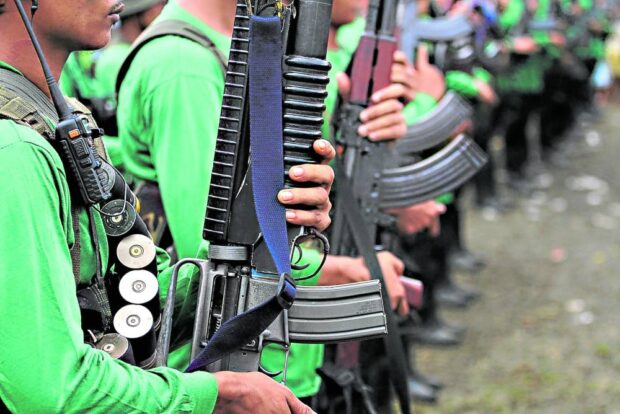
HOLIDAY TRUCE The New People’s Army, whose members are seen wielding high-powered firearms in this photo taken in Marihatag, Surigao del Sur, on Dec. 26, 2018, will lay down their weapons from Dec. 25 to Dec. 26, marking the 55th anniversary of the Communist Party of the Philippines. —ERWIN MASCARIÑAS
The Communist Party of the Philippines (CPP) ordered its armed wing, the New People’s Army (NPA), to lay down its arms for two days, from 12:01 a.m. on Christmas Day to 11:59 p.m. on Dec. 26, to mark the group’s 55th anniversary.
The ceasefire announcement came a month after the Nov. 23 signing by the government and the CPP’s political arm, the National Democratic Front of the Philippines (NDFP), of the Joint Statement in Oslo, Norway, agreeing in principle to end Asia’s longest armed struggle since the previous Duterte government terminated peace talks in 2017.
It was also the first holiday truce declared by the insurgents since December 2019, which was still marked by sporadic violence, and the first unilateral ceasefire since the period from March 26, 2020 to April 30, 2020, in response to the United Nations’ call for a global armistice during the COVID-19 pandemic.
“The two-day ceasefire aims to allow the peasant masses and NPA units in their area to conduct assemblies, meetings or gatherings to celebrate the Party’s anniversary, look back at past achievements, and pay tribute to all heroes and martyrs of the Philippine revolution,” the CPP’s central committee and the NPA’s national operations command said in a statement on Saturday.
Clashes in Batangas, Quezon
“This ceasefire declaration is also in solidarity with people’s traditional holiday celebrations,” it added.
As of press time on Saturday, there was no government order reciprocating the CPP’s move.
In an earlier briefing, the spokesperson of the Philippine National Police, Col. Jean Fajardo, said the PNP was not inclined to recommend a ceasefire in the wake of the Dec. 17 skirmish between soldiers and communist rebels in Balayan, Batangas, and the Dec. 19 clash in Tagkawayan, Quezon.
One Army soldier and six insurgents were killed in the Batangas encounter.
In response to the incidents, police units in Batangas and Quezon provinces have intensified border control and checkpoint operations to flush out the rebels involved in the clashes, according to Fajardo.
The PNP has been on full alert since Dec. 15, which means all 228,000 police officers and personnel are available and ready for emergencies and anticrime operations during the holiday season.
According to the CPP, the NPA could resume guerrilla warfare immediately at 12:01 a.m. of Dec. 27.
“Amid worsening economic crisis and intensifying oppression under the Marcos regime, the NPA must continue to carry out extensive and intensive guerrilla warfare to fight state terrorism and defend the people’s democratic rights and interests,” it said.
The CPP also placed all units of the NPA on “high alert,” reminding them to “be vigilant and ready to act in self-defense to counter and frustrate hostile movement or actions of enemy units within the scope of the NPA’s guerrilla fronts and areas of operations.”
“The NPA and the masses are advised to maintain a high level of secrecy in the conduct of their activities,” it noted.
‘Ensure peaceful Christmas’
Army Col. Dennis Cana, public information officer of the military’s Southern Luzon Command (Solcom), said the unit had yet to receive the official position of the military leadership on the CPP’s ceasefire declaration.
“But for us in Solcom, we will continue our duties to support law enforcement operations,” Cana said, adding: “We will help ensure a peaceful and meaningful celebration of Christmas.”
The Marxist-Leninist-Maoist CPP was founded on Dec. 26, 1968, by the writer and activist professor Jose Maria Sison as a breakaway group from the pro-Soviet Partido Komunista ng Pilipinas.
On March 29, 1969, the CPP formed the NPA in a village in Tarlac province, its first ragtag group of guerrillas armed with automatic rifles, single-shot rifles, and handguns.
Since then, the NPA has been waging the longest communist rebellion in the world.
Sison died of heart failure on Dec. 16, 2022, at age 83 in Utrecht, the Netherlands. He had lived in self-exile in Europe since peace talks with the government bogged down in 1987.
Amnesty proclamation
In the Nov. 23 Oslo statement, the government and the NDFP agreed to a “principled and peaceful resolution of the armed conflict” by, among others, addressing its “socioeconomic and political drivers.”
President Marcos also issued Proclamation No. 404, offering amnesty to communist rebels.
But many on the government’s side remain wary of the prospect of restarting peace negotiations, including Vice President Sara Duterte, who earlier this month described the Oslo statement as “an agreement with the devil.”
The chief of the Armed Forces of the Philippines, Gen. Romeo Brawner Jr., said Duterte could not be blamed for such views.
“In fact, this opinion is shared by so many in our country, even soldiers,” Brawner said.
RELATED STORIES
‘No reason’ for holiday ceasefire, says CPP